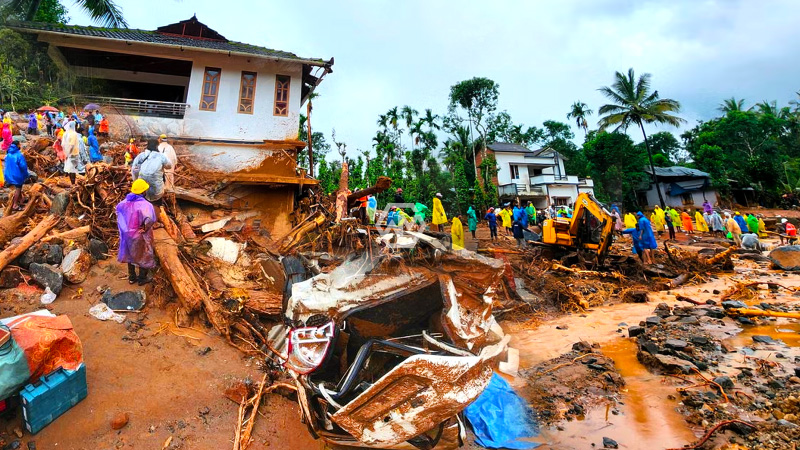- Death toll from Kerala landslides rises to at least 158, with more rain expected.
- The state has declared a holiday in 11 districts and all educational institutions are closed.
- Rescue operations are ongoing with help from the Navy, NDRF, and local officials.
The catastrophic landslides in Kerala’s Wayanad district have claimed the lives of at least 158 people and caused widespread destruction.
The India Meteorological Department has issued warnings of continued heavy rainfall, potentially worsening the situation. With strong surface winds expected, rescue and relief efforts are being hampered by challenging weather conditions.
Kerala in Crisis: Landslides Leave 158 Dead Amidst Ongoing Torrential Rains
In response, the Kerala government has enacted a series of measures, including declaring a state of mourning with national flags at half-mast. Educational institutions are closed, and a holiday has been declared across 11 districts to facilitate relief operations. The military and NDRF are actively engaged in rescue efforts, working alongside local officials and volunteers to assist affected individuals and manage the crisis.
The Odisha government has also stepped in to support Kerala, particularly in the search for missing tourists from Cuttack. With several people still unaccounted for, coordinated efforts between state and central authorities are crucial for managing the ongoing rescue operations and ensuring the safety of all affected individuals.
As rescue operations continue, the focus is on addressing immediate needs such as temporary housing for displaced persons and restoring critical infrastructure. The scale of the disaster highlights the urgent need for both short-term aid and long-term strategies to mitigate the impact of such calamities in the future.
The devastating landslides in Kerala have brought to light the urgent need for coordinated disaster response and long-term planning. As rescue operations continue, the state and central governments, along with local communities and volunteers, are working together to provide relief and begin the recovery process. The resilience and solidarity shown in the face of this tragedy will be vital in overcoming the immediate challenges and rebuilding affected areas.
“The nation is weeping. We need to have long-term and short-term strategies regarding how to stop these types of calamities,” – KC Venugopal.



